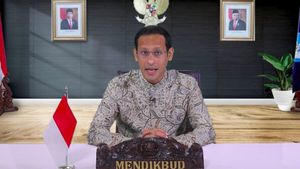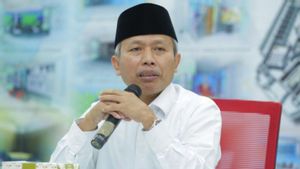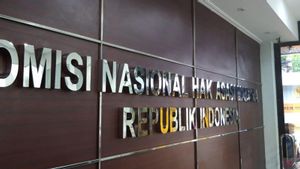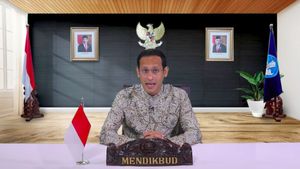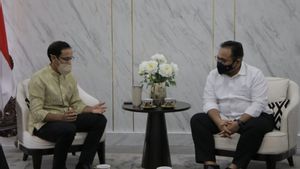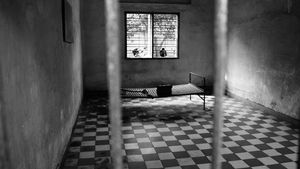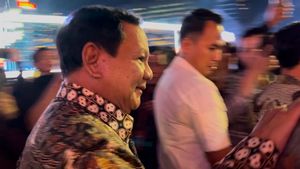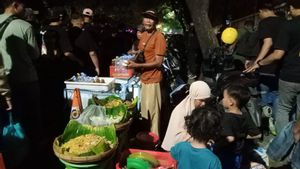JAKARTA - Minister of Education, Culture, Research and Technology (Mendikbudristek), Nadiem Anwar Makarim, said Regulation of Minister of Education, Culture, Research and Technology (Permendikbudristek) Number 30 of 2021 concerning Prevention and Handling of Sexual Violence in Higher Education (Permendikbudristek PPKS) details the forms and sanctions of sexual violence.
"Permendikbudristek PPKS details the form of action with the consequences of administrative sanctions, recognizes the possibility of this form of sexual violence developing and regulates preventive measures to reduce losses due to cases of sexual violence", said Minister of Education, Culture, Research, and Technology (Mendikbudristek), Nadiem Anwar Makarim, at the launch of Merdeka Learning Episode Fourteen: Merdeka Campus from Sexual Violence in Jakarta, reported by Antara, Friday, November 12.
The target of the PPKS Permendikdubristek is to prevent and deal with at least 11 possible incidents of sexual violence that afflict relationships between students, educators, education staff, campus residents, and the general public who interact with students, educators, and education staff.
In Article 4, for example, it is stated that if a college student X experiences sexual violence committed by a college student Y, the task force of the two campuses refers to the PPKS Permendikbudristek for handling it.
So far, in the process of handling sexual violence, there is often confusion regarding what things can be understood as sexual violence. The lack of understanding related to this often complicates the process of handling sexual violence in the university environment.
Referring to Article 5, which includes acts of sexual violence are verbal, non-physical, physical, and through information and communication technology. Nadiem also explained that the PPKS Permendikbudristek also seeks to eliminate the "gray" areas that have existed so far.
“What is a gray area? The gray area is activities that are understood not in black and white, whether they constitute sexual violence or not", he said.
SEE ALSO:
The Minister of Education and Technology assessed that Indonesia is currently in an emergency situation of sexual violence in universities. Because, sexual violence is the most difficult to prove, but the effects are very large and long term. Therefore, if there are reports of sexual violence, universities are required to take action which includes assistance, protection, recovery of victims and the imposition of administrative sanctions.
Referring to Articles 10 to 19, Minister Nadiem invited the academic community to play an active role in protecting victims.
"The assistance in question includes counseling, advocacy, health services, legal assistance, social and spiritual guidance, as well as assistance for persons with disabilities", he said.
Related to protection here, it includes ensuring the continuity of education or work, providing safe houses, and free victims or witnesses from threats related to the testimony given.
Meanwhile, recovery activities for victims are carried out together with related parties with the consent of victims or witnesses and do not reduce learning and/or employment rights. Furthermore, regarding the imposition of administrative sanctions, namely targeting group sanctions, individual sanctions, and sanctions for universities.
“Sanctions to perpetrators must be based on the impact of their actions on the condition of the victim and the campus environment, not a large chance of the perpetrator repenting. The chancellor and director of universities are fully responsible for implementing the PPKS Permendikbudristek and can impose sanctions that are heavier than the recommendations of the task force", said Nadiem.
It was also stated that the task force at the university level, which will assist the chancellor and director in implementing the PPKS Permendikbudristek, needs to understand education about preventing sexual violence, be able to handle reporting, ensure the confidentiality of the identities of parties directly related to reports and maintain the independence of the task force.
If the decision of the higher education leader is deemed unfair, the victim and/or the reported party may ask the Director-General of Higher Education, Research, and Technology (Dirjen Diktiristek) and/or the Director-General of Vocational Education (Dirjen Diksi) to conduct a re-examination. The Chancellor and director must routinely monitor and evaluate all activities to prevent and handle sexual violence, as well as the performance of the task force on campus.
The English, Chinese, Japanese, Arabic, and French versions are automatically generated by the AI. So there may still be inaccuracies in translating, please always see Indonesian as our main language. (system supported by DigitalSiber.id)



